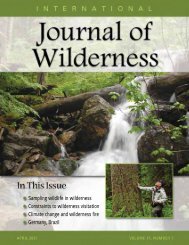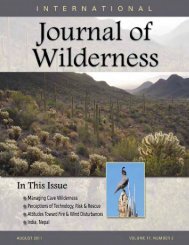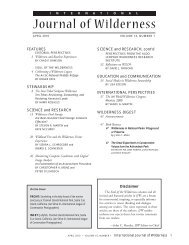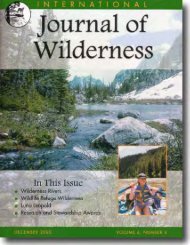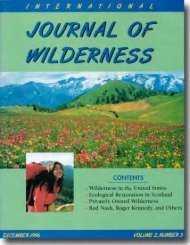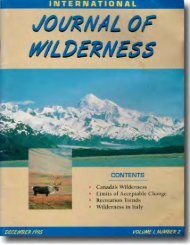Download full PDF - International Journal of Wilderness
Download full PDF - International Journal of Wilderness
Download full PDF - International Journal of Wilderness
Create successful ePaper yourself
Turn your PDF publications into a flip-book with our unique Google optimized e-Paper software.
Conflicts between resident people and protected area<br />
managers, particularly over property rights and<br />
livelihood activities occurring within areas now<br />
designated as parks, have been widespread.<br />
REFERENCES<br />
Bruner, A., R. Gullison, R. Rice, and G. da<br />
Fonseca. 2001. Effectiveness <strong>of</strong> parks in<br />
protecting tropical biodiversity. Science 291:<br />
125–128.<br />
Collier, G., D. Mountjoy, R. Nigh. 1994. Peasant<br />
agriculture and global change.<br />
BioScience 44: 398–407.<br />
Food and Agriculture Organization <strong>of</strong> the<br />
United Nations, 1989. Household Food<br />
Security: An Analysis <strong>of</strong> Socio-economic<br />
Issues. Rome: FAO.<br />
From BOOK REVIEWS on page 47<br />
In very much the style <strong>of</strong> Barry<br />
Lopez’s Arctic Dreams, Mulvaney has<br />
compared and contrasted the stories <strong>of</strong><br />
the poles into the separate stories <strong>of</strong><br />
particular animals, peoples, and industries.<br />
Beginning with an introduction<br />
to the poles in human psyche and the<br />
fact that “penguins live in the Antarctic;<br />
polar bears live in the Arctic” (p.<br />
19), the author provides historical interpretation<br />
<strong>of</strong> the bowhead whale<br />
(chapter 2), sealing (chapter 3), whaling<br />
and controversy within the <strong>International</strong><br />
Whaling Commission (chapter<br />
4), politics and activism (chapter 5),<br />
and oil exploration (chapter 6).<br />
The major theme running through<br />
the entire book is that <strong>of</strong> the polar regions<br />
as the “last wilderness,” and how<br />
the polar wilderness has been exploited,<br />
how nations and companies<br />
Geist, H., and E. Lambin. 2002. Proximate causes<br />
and underlying driving forces <strong>of</strong> tropical deforestation.<br />
BioScience 52: 143–150.<br />
Li, T. 2001. Agrarian differentiation and the limits<br />
<strong>of</strong> natural resource management in upland<br />
Southeast Asia. IDS Bulletin 32(4): 88–94.<br />
MacKinnon, K., and W. Wardojo. 2001. ICDPs:<br />
imperfect solutions for imperiled forests in<br />
South-East Asia. Parks 11(2): 50–59.<br />
Putz, F., G. Blate, K. Redford, R. Fimbel, and J.<br />
Robinson. 2001. Tropical forest management<br />
and conservation <strong>of</strong> biodiversity: An<br />
have fought and resolved to protect<br />
such wilderness and how nongovernmental<br />
organizations, namely<br />
Greenpeace, have assisted in the process.<br />
The final chapter <strong>of</strong> the book<br />
(chapter 7), apart from summarizing,<br />
illustrates the significance <strong>of</strong> this last<br />
wilderness: it is important as an indicator<br />
<strong>of</strong> global health and more widespread<br />
environmental problems, but<br />
also as a place demonstrating the value<br />
<strong>of</strong> conservation to humanity. The appropriateness<br />
<strong>of</strong> tourism as the primary<br />
way in which growing numbers <strong>of</strong> e<br />
people now experience the polar wilderness<br />
is left as a question for the<br />
reader to ponder and form their own<br />
opinion about.<br />
Overall, At the Ends <strong>of</strong> the Earth: A<br />
History <strong>of</strong> the Polar Regions is a joy to<br />
read and an important contribution to<br />
42 <strong>International</strong> <strong>Journal</strong> <strong>of</strong> <strong>Wilderness</strong> DECEMBER 2002 • VOLUME 8, NUMBER 3<br />
overview. Conservation Biology 15: 7–20.<br />
Struhsaker, T. 1998. A biologist’s perspective on<br />
the role <strong>of</strong> sustainable harvest in conservation.<br />
Conservation Biology 12: 930–932.<br />
Terborgh, J. 1999. Requiem for Nature. Washington,<br />
D.C.: Island Press.<br />
West, P. and S. Brechin, eds. 1991. Resident<br />
Peoples and National Parks. Tucson: University<br />
<strong>of</strong> Arizona Press.<br />
Wilshusen, P., S. Brechin, C. Fortwangler, and P.<br />
West. 2002. Reinventing a square wheel:<br />
Critique <strong>of</strong> a resurgent “protection paradigm”<br />
in international biodiversity conservation.<br />
Society and Natural Resources 15: 17–40.<br />
STEPHEN SIEBERT and JILL BELSKY are<br />
pr<strong>of</strong>essors in the School <strong>of</strong> Forestry at the<br />
University <strong>of</strong> Montana. Stephe welcomes<br />
correspondence at School <strong>of</strong> Forestry,<br />
University <strong>of</strong> Montana, Missoula, MT<br />
59812, USA. Phone: 406-243-4661;<br />
e-mail: siebert@forestry.umt.edu.<br />
appreciating the wider context <strong>of</strong> interconnections<br />
occurring all over the<br />
Earth. Mulvaney’s writing style is a<br />
combination <strong>of</strong> personal experience,<br />
touches <strong>of</strong> humor and irony, and indepth,<br />
concise research. Mulvaney expertly<br />
conveys the fact that “for eons<br />
the Polar Regions existed through stasis<br />
and change, without any hint <strong>of</strong><br />
involvement … but as the world grows<br />
smaller, the ends <strong>of</strong> the Earth are no<br />
longer out <strong>of</strong> reach … more accessible,<br />
and potentially more vulnerable than<br />
ever before” (p. 245). If this is true for<br />
the poles, then the same can definitely<br />
be said for all wilderness.<br />
Reviewed by PATRICK MAHER, Ph.D.<br />
candidate at Lincoln University, New<br />
Zealand, who is examining the tourist<br />
experiences and outcomes in Antarctica.<br />
E-mail: maherp@lincoln.ac.nz.



